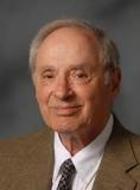Herb Scarf
Sterling Professor of Economics
 Herb Scarf, A.B. Temple University, Ph.D. Princeton University, faculty member at Yale since 1963, following three years at the Rand Corporation and six at Stanford University: you are a superb mathematician who has made fundamental contributions to economics and management science. Your powers as a mathematician were evident early on when, as a high school student at South Philadelphia for Boys– a school so scary you never went to class but simply took the exams - you emerged from nowhere to win the Pennsylvania State Mathematics Competition, astonishing all aspirants. Later, at Temple, you placed in the top ten in the Putnam Competition, again amazing people who believed that someone relatively untrained could not be so mathematically sophisticated. While still a graduate student at Princeton you published your first paper in the Proceedings at the National Academy of Sciences –another extraordinary achievement.
Herb Scarf, A.B. Temple University, Ph.D. Princeton University, faculty member at Yale since 1963, following three years at the Rand Corporation and six at Stanford University: you are a superb mathematician who has made fundamental contributions to economics and management science. Your powers as a mathematician were evident early on when, as a high school student at South Philadelphia for Boys– a school so scary you never went to class but simply took the exams - you emerged from nowhere to win the Pennsylvania State Mathematics Competition, astonishing all aspirants. Later, at Temple, you placed in the top ten in the Putnam Competition, again amazing people who believed that someone relatively untrained could not be so mathematically sophisticated. While still a graduate student at Princeton you published your first paper in the Proceedings at the National Academy of Sciences –another extraordinary achievement.
All that early promise has been borne out in your later distinguished accomplishments. Your pioneering work on optimal inventory control is the foundation of that subject. Your algorithm for computing general equilibrium is at the core of the flourishing field of applied general equilibrium, which your collaboration with students and colleagues created, and which is now widely used to estimate the effects of public policy. Your ambitious research agenda in integer programming, motivated by the discreteness of many business problems, has provided algorithms that not only give a solution, but deepen the user’s understanding of the particular problem faced, and has attracted a growing group of talented investigators both in economics and computer science.
For all of these fundamental and sustained contributions to theory in operations research and management sciences you have been recognized by your membership in the National Academy of Sciences and by the award of the John von Neumann Medal
In everything you do, your quality of mind is widely admired. When you were made a Distinguished Fellow of the American Economics Association your biographers noted that you “evolve a style of time-intensive full engagement” with the most challenging problems, and then with infinite patience and inventiveness, sometimes over a period of years, work to understand their essential elements, craft elegant and ingenious solutions, and explain your findings. Your oral and written expositions are models of clarity of thought and courtesy to your audience. Perhaps this is part of what makes you such a superb teacher, one whose respect and care for students has made you a role model for generations of graduate students and a legend among undergraduates.
Although you have sustained a research agenda throughout your entire career, and the intellectual problems you have engaged have become part of the fabric of your life, you have nevertheless also served your school and your profession, as director of the Cowles Foundation and director of the Division of Social Sciences at Yale, and as chairman of the section of Economic Sciences at the National Academy of Sciences. Mathematical theorist though you are, you are at ease in the world of humanities and arts. Your friends know you as an avid reader, devotee of the arts, and a friend and supporter of writers and artists who are a part of your wide circle of friends. Now as you retire from Yale to continue the highest form of play—mathematical thinking—as well as the magical entertainments of high culture—your colleagues send you off with the hope that you will sustain in the future the algorithm you have discovered for personal equilibrium.
Tribute Editor: Penelope Laurans